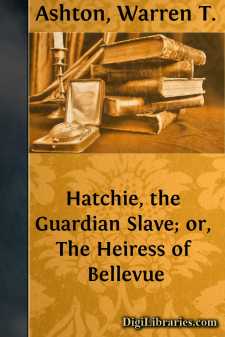Categories
- Antiques & Collectibles 13
- Architecture 36
- Art 48
- Bibles 22
- Biography & Autobiography 813
- Body, Mind & Spirit 142
- Business & Economics 28
- Children's Books 17
- Children's Fiction 14
- Computers 4
- Cooking 94
- Crafts & Hobbies 4
- Drama 346
- Education 46
- Family & Relationships 57
- Fiction 11829
- Games 19
- Gardening 17
- Health & Fitness 34
- History 1377
- House & Home 1
- Humor 147
- Juvenile Fiction 1873
- Juvenile Nonfiction 202
- Language Arts & Disciplines 88
- Law 16
- Literary Collections 686
- Literary Criticism 179
- Mathematics 13
- Medical 41
- Music 40
- Nature 179
- Non-Classifiable 1768
- Performing Arts 7
- Periodicals 1453
- Philosophy 64
- Photography 2
- Poetry 896
- Political Science 203
- Psychology 42
- Reference 154
- Religion 513
- Science 126
- Self-Help 84
- Social Science 81
- Sports & Recreation 34
- Study Aids 3
- Technology & Engineering 59
- Transportation 23
- Travel 463
- True Crime 29
Hatchie, the Guardian Slave; or, The Heiress of Bellevue
by: Warren T. Ashton
Categories:
Description:
Excerpt
INTRODUCTION.
In the summer of 1848 the author of the following tale was a passenger on board a steamboat from New Orleans to Cincinnati. During the passage—one of the most prolonged and uncomfortable in the annals of western river navigation—the plot of this story was arranged. Many of its incidents, and all its descriptions of steamboat life, will be recognized by the voyager of the Mississippi.
The tale was written before the appearance of "Uncle Tom's Cabin,"—before negro literature had become a mania in the community. It was not designed to illustrate the evils or the blessings of slavery. It is, as its title-page imports, a tale; and the author has not stepped out of his path to moralize upon Southern institutions, or any other extraneous topic. But, as its locale is the South, and its principal character a slave, the story incidentally portrays some features of slavery.
With these explanations, the author submits the tale to the public, hoping the reader will derive some portion of the pleasure from its perusal which he experienced in its preparation.
BOSTON, November 18, 1852.
HATCHIE:
"Antony. You grow presumptuous.
Ventidius. I take the privilege of plain love to speak.
Antony. Plain love!—Plain arrogance! plain insolence!"
DRYDEN.
On the second floor of a lofty building in —— street, New Orleans, was situated the office of Anthony Maxwell, Esq., Attorney and Counsellor at Law, Commissioner for Georgia, Alabama, and a dozen other states. His office had not the usual dusty, business-like aspect of such places, but presented more the appearance of a gentleman's drawing-room; and, but for the ponderous cases of books bound in law-sheep, and a table covered with tin boxes and bundles of papers secured with red tape, the visitor would easily have mistaken it for such. The space on the walls not occupied by book-cases was hung with rich paintings, whose artistic beauty and elevated themes betokened a refined taste. The floor of the room was covered by a magnificent tapestry carpet. The chairs, lounges and tables, were of the most costly and elegant description. The windows were hung with graceful and brilliant draperies. Every arrangement of the office betokened luxury and indolence, rather than the severe toil and privation to which the aspirant for legal honors must so often submit. The costly appurtenances of the apartment seemed to indicate that the young lawyer's path to fame was over a velvet lawn, bedecked with beautiful flowers, rather than the rough road, steep and crooked, over which the greatest statesmen and most eminent jurists have trodden.
The occupant of this chamber was stretched at full length upon one of the luxurious lounges, puffing, with an abstracted air, a fragrant regalia. He was a young man, not more than five-and-twenty years of age, and what ladies of taste would have styled decidedly handsome. His face was pale, with a certain haggard appearance, which indicates the earlier stages of dissipation. His complexion was of a delicate white, unbrowned by the southern sun, and the skin was so transparent that the roots of his black beard were visible beneath its surface. His jet-black hair hung in rich, wavy curls, which seemed to be the especial care of some renowned tonsorial artist, so gracefully and accurately were they arranged. His black eye was sharp and expressive when his mind was excited in manly thought; but now it was a little unsteady,—disposed to droop, and wander, as though ashamed to express the emotions which agitated his soul. Altogether, his features were classic; but there was something about them which the moralist would not like—a sort of lascivious softness mingling with the nobler intellectual expression, that warned him to beware of the Siren, while he admired the Apollo.
The marks of vice were visible in his countenance. They had not yet become canker-spots on the surface, but they rankled and festered beneath that fair field of physical and intellectual grandeur.
The young attorney was dressed in the extreme of fashion, yet in good taste. Though he wore all the fashion demanded, he did not court ridicule by overstepping its flickering lines....


